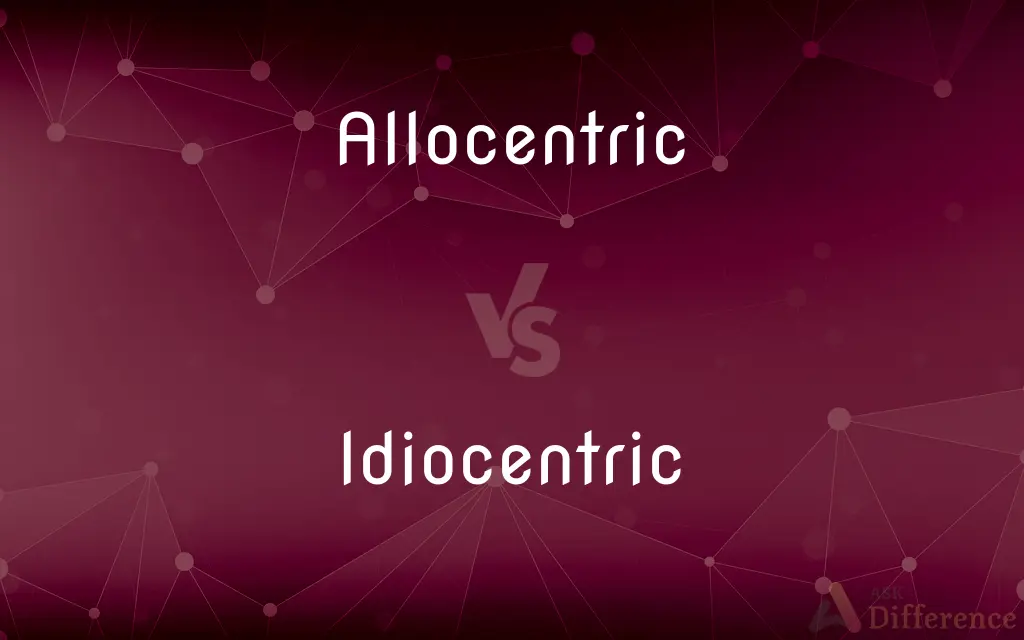Allocentric vs. Idiocentric — What's the Difference?
By Maham Liaqat & Fiza Rafique — Updated on March 15, 2024
Allocentric individuals prioritize group needs and social contexts, valuing collectivism, while idiocentric individuals emphasize personal goals and individuality, leaning towards individualism.

Difference Between Allocentric and Idiocentric
Table of Contents
ADVERTISEMENT
Key Differences
Allocentric people are oriented towards others, focusing on the needs, goals, and norms of their group or community. They often make decisions based on social harmony and collective well-being, reflecting a collectivist viewpoint. In contrast, idiocentric individuals center their perspective on themselves, prioritizing personal achievements, autonomy, and independence, indicative of an individualist stance.
In an allocentric culture, behaviors and attitudes are greatly influenced by family, community, and societal expectations. Social roles and interconnectedness are emphasized, with individuals often finding identity within the context of their relationships and group affiliations. Meanwhile, idiocentric cultures foster self-expression, competition, and personal success, with a strong emphasis on distinguishing oneself from the group and achieving personal goals.
Communication styles also differ between allocentric and idiocentric orientations. Allocentrics may use more indirect communication, valuing harmony and avoiding conflict, while idiocentrics tend to be more direct and assertive, valuing clear and straightforward expression of personal opinions.
In the workplace, allocentric individuals might excel in collaborative environments, valuing teamwork and collective achievements. Idiocentric individuals, on the other hand, might thrive in roles that reward individual initiative, innovation, and personal accomplishment.
Understanding whether someone is allocentric or idiocentric can enhance interpersonal relationships and communication, as it provides insight into their motivations, preferences, and behaviors, allowing for more effective interaction in both personal and professional settings.
ADVERTISEMENT
Comparison Chart
Orientation
Community and group-focused.
Self and individual-focused.
Values
Collectivism, social harmony, and interdependence.
Individualism, autonomy, and independence.
Decision-making
Influenced by group norms and collective well-being.
Based on personal goals and self-interest.
Communication Style
Indirect, emphasizes harmony and consensus.
Direct and assertive, prioritizes clarity of personal expression.
Work Environment
Prefers collaborative settings, values teamwork.
Excels in roles that reward individual achievement and initiative.
Cultural Context
Common in collectivist societies (e.g., many Asian cultures).
Prevalent in individualist societies (e.g., USA, Western Europe).
Compare with Definitions
Allocentric
Oriented towards the group, prioritizing collective over individual interests.
In allocentric cultures, community celebrations are central to social life.
Idiocentric
Focuses on self-interest and personal goals, valuing independence.
Her idiocentric choice to travel solo reflects her value for personal freedom.
Allocentric
Values interdependence and social harmony in relationships.
She always seeks consensus, showcasing her allocentric nature.
Idiocentric
Makes decisions based on personal benefits and achievements.
Choosing a job for its career advancement opportunities is an idiocentric decision.
Allocentric
Makes decisions based on social norms and the well-being of others.
He chose his career path considering his family's expectations, an allocentric approach.
Idiocentric
Thrives in competitive environments that reward individual efforts.
Idiocentric workers often aim for personal recognition and accolades.
Allocentric
Prefers collaborative work environments that emphasize teamwork.
Allocentric employees excel in projects requiring close cooperation.
Idiocentric
Emphasizes individuality and personal expression in relationships.
His idiocentric approach often leads to prioritizing personal projects.
Allocentric
Communication style is indirect, aiming to maintain group harmony.
His allocentric communication often involves suggesting rather than demanding.
Idiocentric
Uses direct communication to express personal opinions and needs.
Her idiocentric style involves stating her needs openly, without equivocation.
Allocentric
Concerned with the condition or well-being of others more than of oneself.
Idiocentric
Characterized by or denoting interest centered upon oneself or one's own ways, rather than upon others or the ways of others; self-centered.
Allocentric
(Philosophy) Having a meaning relative to the perspective of some subject other than oneself.
Idiocentric
Deviating from the norm; eccentric.
Allocentric
Concerned with the interests of others more than one's own; community-minded.
Allocentric
Of spatial representations: linked to a reference frame based on the external environment and independent of one's current location in it (for example, giving a direction as "north" as opposed to "right").
Allocentric
Of a tourist: tending to be adventurous and preferring novel and unfamiliar experiences.
Allocentric
A tourist who tends to be adventurous and to prefer novel and unfamiliar experiences.
Common Curiosities
Can cultural background predict allocentric or idiocentric orientation?
While cultural background influences these orientations, individual variations exist, and it's not a definitive predictor of personal orientation.
Can a person be both allocentric and idiocentric?
Individuals can exhibit a mix of both traits, depending on the context and situation, although they might have a dominant orientation.
How does upbringing influence allocentric or idiocentric tendencies?
Family, culture, and societal norms significantly shape these orientations, with collectivist societies fostering allocentrism and individualist societies encouraging idiocentrism.
How do allocentric and idiocentric orientations affect leadership styles?
Allocentric leaders may emphasize consensus and collective goals, while idiocentric leaders might focus on vision, innovation, and personal accountability.
How do allocentric and idiocentric values manifest in consumer behavior?
Allocentric consumers may prioritize products that are endorsed by their community, while idiocentric consumers might seek items that emphasize personal style and distinction.
How do these orientations impact mental health and well-being?
Both orientations have implications for well-being, with allocentrism linked to social support and idiocentrism to autonomy, but they can also lead to stress if in conflict with one's environment.
Are allocentric traits more valuable in a team setting?
Allocentric traits can enhance teamwork and collaboration, but idiocentric traits like initiative and innovation are also valuable in a team context.
Can societal changes shift an individual's orientation from allocentric to idiocentric or vice versa?
Societal changes, life experiences, and personal growth can influence an individual's orientation, potentially leading to shifts over time.
Is one orientation better than the other?
Neither is inherently better; both orientations have their strengths and challenges, and their effectiveness can depend on the context.
How do allocentric and idiocentric orientations influence conflict resolution?
Allocentrics might avoid direct confrontation to maintain harmony, while idiocentrics may address conflicts head-on to reach a resolution.
Can education and workplace cultures influence a shift between allocentric and idiocentric orientations?
Yes, educational and workplace environments can encourage the development of either orientation, depending on their values and practices.
Are there specific challenges that allocentric or idiocentric individuals face in a globalized world?
In a globalized world, allocentrics might struggle with the emphasis on individual success, while idiocentrics may find challenges in collaborative, multicultural settings.
Can technology and social media influence one's allocentric or idiocentric tendencies?
Technology and social media can reinforce idiocentric tendencies through personal branding, but they also provide platforms for allocentric values like community building.
How can understanding these orientations improve interpersonal communication and relationships?
Recognizing whether someone is allocentric or idiocentric can enhance empathy, tailor communication strategies, and foster more harmonious relationships.
How do allocentric and idiocentric orientations affect social relationships?
Allocentrics might prioritize group activities and consensus, while idiocentrics may seek relationships that affirm their individuality and personal goals.
Share Your Discovery

Previous Comparison
Para vs. Peri
Next Comparison
Nill vs. NilAuthor Spotlight
Written by
Maham LiaqatCo-written by
Fiza RafiqueFiza Rafique is a skilled content writer at AskDifference.com, where she meticulously refines and enhances written pieces. Drawing from her vast editorial expertise, Fiza ensures clarity, accuracy, and precision in every article. Passionate about language, she continually seeks to elevate the quality of content for readers worldwide.
















































